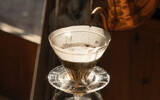Why are there two different thicknesses of coffee beans ground under the same grinding process? What does friability have to do with density?
Some time ago, a friend was backstage in front of the street: "he grinds two different beans with the same scale. The first bean is brewed normally and the coffee tastes right, but the other bean is blocked when it is brewed!" caused excessive extraction. Why did this happen when the same scale was used? "

It's simple, because it has something to do with the "brittleness" of coffee beans! To mention brittleness, we need to know the density of coffee beans first, because brittleness and density are very closely related.
What is density? Density refers to the amount of material contained per unit volume. The more the quantity, the higher the density. The density of coffee beans is determined by the growing environment, when coffee beans grow at a higher altitude, the temperature will be lower. The lower the temperature, the slower the coffee grows!

(Qianjie coffee farm in Yunnan) slow-growing coffee beans have more time to absorb more nutrients, which are substances. The increase in the number of substances is equivalent to the increase in the density of the coffee bean itself. the higher the density, the harder the bean itself will be. At the same time, it will also give coffee beans a fuller flavor.
Therefore, some countries will distinguish the hardness and grade of beans according to the altitude at which beans are planted. (for example, in Costa Rica in Central America, coffee beans grown in Costa Rica above 1400 meters above sea level are very hard beans of SHB grade. )
What is brittleness? Brittleness "Brittleness", also known as brittleness. It refers to the phenomenon that fracture occurs under the action of external forces such as extrusion or tension. Brittleness and hardness belong to the relative relationship! The higher the hardness, the lower the brittleness, and vice versa. So what determines brittleness?
Yes, the degree of baking! It is reasonable that the whole roasting process of coffee beans is a dehydration process. The longer the roasting time, the more water evaporates from the coffee beans. If the moisture is reduced, then its internal structure will naturally be relatively loose! The loose structure represents the decrease of density and the increase of brittleness. In other words, the deeper the baking, the higher the brittleness, and vice versa! We can do an experiment: prepare a deep-baked coffee bean and a light-roasted coffee bean, put them on the table and press them separately. Then you will find that deep baked beans are easily crushed by us, which is the result of high brittleness, while shallow baked beans take a certain amount of effort to crush because of their high density and low brittleness.
(warm reminder on the front street: it is best to press the bean with the plane up, or you will experience the joy of holding an egg with your bare hands.) so how does brittleness affect the degree of grinding? The force on coffee beans during grinding comes from the squeezing force between the two cutters and the cutting force when the cutter head rotates. When the grinding scale is the same, deep baked beans are more likely to be crushed because of their high brittleness, while shallow baked beans are more difficult to grind because of their high density and need to be polished many times before they can be ground out. Therefore, the particles of deep-roasted beans will be much smaller than those of light-roasted coffee, and at the same time, a lot of fine powder will be broken out because of its "brittleness". (replace it with cookies and cookie crumbs.) here is an experiment done on the front street in which the two beans with the greatest difference in baking are ground with the same scale, and then get a completely different degree of grinding. The grinding parameters are as follows: coffee beans are: deep-baked manning, light-baked Yega Chuefei. Grinding scale: Ek43 9.5 scale. The experimental results showed that the screening rate of Manning's No. 20 screen was 75%, and that of Yega Xuefei's No. 20 screen was 65%.
Therefore, even under the same grinding scale, the different degree of baking of the two beans will lead to differences in the ground particles. Like the friend at the beginning, it was because the blocked coffee beans were roasted deeper and more brittle, which led to a finer powder under the same grinding. The over-fine coffee powder plugged the holes in the filter paper, which led to the negative situation of the filter paper.
-END-
Front Street Cafe
No. 10 Baoqian street, Yandun road, Dongshankou, Yuexiu district, Guangzhou, Guangdong province
Important Notice :
前街咖啡 FrontStreet Coffee has moved to new addredd:
FrontStreet Coffee Address: 315,Donghua East Road,GuangZhou
Tel:020 38364473
- Prev

Guests become shopkeepers "mouth for" to drive customers, netizens: not suitable!
▲ Click to follow | Daily boutique Coffee Culture Magazine Coffee Workshop for many coffee shopkeepers, noisy children should be one of the customers they are afraid to encounter. Most of the public impression of the cafe is quiet and comfortable, and the noisy play of children may disturb the good environment in the shop.
- Next

What's the difference between a hand grinder and an electric grinder? Which rookie should buy?
As coffee is gradually integrated into people's daily life, more and more friends begin to choose to make their own coffee. And the most important thing to make coffee is to buy utensils! The quality of an utensil can directly affect the final taste of coffee, among which the biggest influence is the "bean grinder". Just like others.
Related
- What grade does Jamaica Blue Mountain No. 1 coffee belong to and how to drink it better? What is the highest grade of Blue Mountain coffee for coffee aristocrats?
- What are the flavor characteristics of the world-famous coffee Blue Mountain No. 1 Golden Mantelin? What are the characteristics of deep-roasted bitter coffee?
- Can I make coffee a second time in an Italian hand-brewed mocha pot? Why can't coffee be brewed several times like tea leaves?
- Hand-brewed coffee flows with a knife and a tornado. How to brew it? What is the proportion of grinding water and water temperature divided into?
- What is the difference between Indonesian Sumatra Mantinin coffee and gold Mantinin? How to distinguish between real and fake golden Mantelin coffee?
- What does bypass mean in coffee? Why can hand-brewed coffee and water make it better?
- Unexpected! Ruixing Telunsu lattes use a smoothie machine to foam milk?!
- % Arabia's first store in Henan opens into the village?! Netizen: Thought it was P's
- Does an authentic standard mocha coffee recipe use chocolate sauce or powder? Mocha Latte/Dirty Coffee/Salty Mocha Coffee Recipe Share!
- What is the difference between Vietnam egg coffee and Norway egg coffee? Hand-brewed single product coffee filter paper filter cloth filter flat solution!

